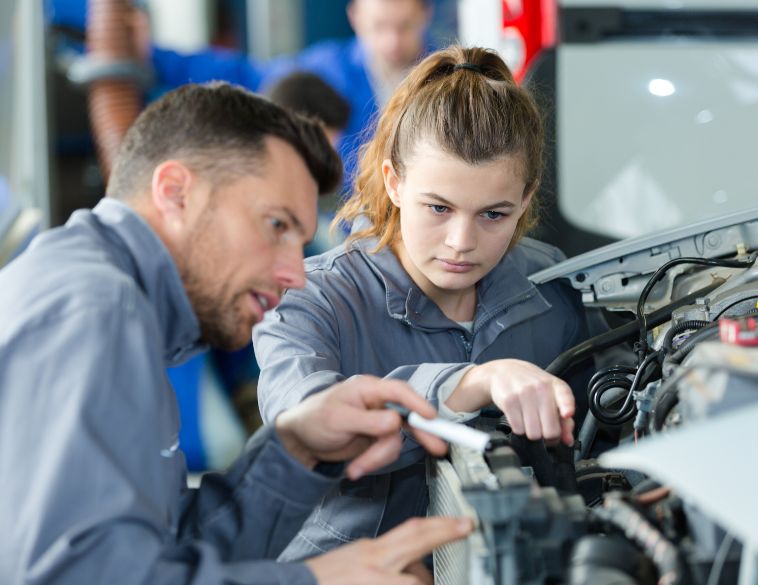For initial training in the automotive field, the DVS are doing better in terms of image today, thanks in part to technological developments in tools and vehicles (DVS) remain the main entry point.
Shorter Attestations of College Studies (ACS) complement them. Continuing education is also offered by various organisations and even by manufacturers or constructors. We were able to discuss this with experts on the challenges of training.

Hard-to-fill cohorts
The training centres that have departments for mechanics, technical advice or bodywork are struggling to fill their benches. Technical jobs are not by definition sexy. DVS are doing better in terms of image today, thanks in part to technological developments in tools and vehicles. They were long considered when there were no more options. Much work still needs to be done to upgrade the sector.
« However, there are a lot of very good car training courses. All the students are placed, often even before the training is finished. But there are a lot of drop-outs along the way, » says Emmanuelle Bourque, 20 years in the automotive industry and current Account Manager at Auto-jobs.ca.
During the pandemic, classes were closed, courses were suspended. Some students preferred to follow a different path.
Assets and alternation

Training centres are usually of interest to people who are looking for non-traditional training, without sitting in a classroom all day, with both theoretical and practical instruction.
“Training is the basis. We can’t want to attract young people to the automotive trades by promising them that they will be trained and recognized, and at the same time see that some hires are made without any training,” says Danielle LeChasseur, Director General of the Sector Committee (CSMO-Auto).
“The centres are adapting by offering work-study programmes [ATE]. The environment is also more welcoming, with advances in schedules and salaries,” adds Cloé Gauvin, Human Resources Advisor at Mobilis Corporation, an organization that brings together more than 145 car and heavy truck dealerships in the greater Quebec City area.
Everyone wins with the ATE. The student enters the world of work with experience. The employer, on the other hand, can easily recruit them because they know they are well trained and have tested them. In order to take on a student on an internship or work-linked training scheme, you need to devote some time to it and have a tutor on your staff to support them. Not all companies can afford this.
“In Quebec, the average age of work experience students is 28. They are not just graduates. So there is also the possibility of getting people who want to go back to school, but with a salary,” says LeChasseur.
Raising awareness of training courses and professions
“We have to create passion. We’re doing a project where we’re taking high school students on safety tours of garages. We have to show them the options, make it more concrete and answer their questions,” says Gauvin.
This seems to be a very interesting initiative, as young people are often not familiar with garages and dealerships until they own a car themselves, far from their environment. They often find it difficult to project themselves.
Hopes with the advancement of technology

“The arrival of electric or hybrid cars and trucks, which are increasingly complex and connected, should attract more people to the industry. The centres must continue to adapt,” says Bourque.
To better prepare for the reality of the sector, after completing a DVS in mechanics for 1800 hours over 19 months, a student can then invest 645 hours in an AEP in electric vehicle mechanics.
“This expertise is a plus, even if some mechanics also have the possibility of training through the manufacturers, but not the majority. The training courses must be close to the market and must evolve,” supports Cristina Almeida, Director of Development, Skills and Recruitment at the Montreal Automobile Dealers Corporation (MACDC).
In support of
With regard to continuing education, some organisations have a role to play, such as the ACPC, which supports its members. It offers modules, often online, of three or four hours, spread over one to three days. These trainings are for example on leadership, customer reception, technical advisors, sales, parts clerks, etc.
“Some employers mistakenly think that if they send their employees to training, they will lose them. But they will have to do it, because cars are changing and their employees will get bored and leave. Now they have no choice,” says Almeida.
CCAM also offers exclusive NADA courses in conjunction with the National Automobile Dealers Association (NADA) in Washington. This is often a prerequisite for reaching a management position.
Many challenges ahead

The Comité sectoriel de main-d’oeuvre des services automobiles (CSMO-Auto) is responsible for monitoring the automotive sector in Quebec and matching training to jobs. They must anticipate future skills. This is the roadmap drawn up by the Quebec government, which funds it.
“Our challenges are great with the labour shortage and the fact that technology is evolving and is everywhere. We want to equip the players to be able to recruit, train and retain their staff. The industry will have to train its staff to cope with the electrification of transport, for example,” says Danielle LeChasseur, its director general.
Let’s not forget that Canada and Quebec plan to ban the sale of new gasoline vehicles by 2035.
“In 2023 it is important to get a DVS. A beginner mechanic can have access to an 800-volt battery. In the development of skills, it is important not to forget basic skills, such as arithmetic and French, which will be used to access training and to progress,” explains LeChasseur.
There are other difficulties in the province. Some regional training centres are located more than 200 kilometres from the workplace, where some DVS are not offered. While the DVS in mechanics is available everywhere, only about fifteen centres offer the DVS in bodywork, and about ten offer the DVS in technical advice.



